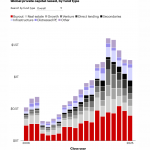The coronavirus crisis has raged across the globe for months now – but some businesses were far quicker to adapt to the growing disaster than others. Private debt investment specialist CVI explains how some of its own portfolio businesses rose to the challenge of a locked-down population.
As said by Winston Churchill: “never waste a good crisis”. Private debt specialist CVI has outlined some key themes that arose from its own portfolio to give a true meaning to the quote.
It believes that by understanding how companies are adapting to new circumstances and operating successfully, it might provide a fresh perspective in these challenging times, when volatility and uncertainty became part of our lives.
Inspirations from individual companies included capitalizing on new demands, as well as creating and capturing value for customers and other stakeholders by creative reactions.
The firm also said it sees an emerging trend to decrease global dependency, from which its target region of the CEE is likely to benefit in Europe.
Creative responses in initial months
“Back in late February, we have seen the pandemic starting in Italy. We proactively started discussions with our portfolio companies but still, – the magnitude of the lockdown was unexpected.” comments Radoslav Tausinger, Managing Director with CVI, “after lockdown the communication further intensified, taking place weekly or even more often.”
Many companies had problems with decreasing revenue, and were looking for support primarily from government-sponsored schemes and programs – topics with which CVI said it was supporting its portfolio companies.
A few companies, however, had already started to look for other markets during the pandemic. “A construction supplier, seeing that their traditional clients in big construction sites were slowing down, looked for new business and found it in the market for individual home improvement,” Tausinger said.
Another example comes from the food industry, which overall was hit less badly by the pandemic – but many things had to be reorganized.
“A frozen product baker saw that grocery stores were less interested in products that could be baked in the store,” CVI principal Pawel Jacel said. “The company came up with a new product line where it started packaging the frozen bread that would the end customer bake on her or his own at home.”
Revenue could also be above pre-COVID levels
In the middle of June, most European countries are beginning to emerge from lockdown, amid the belief that the worst of the coronavirus crisis has been passed. Many businesses have started to see that their revenue is stabilizing, CVI said, – and there are a few cases that point towards business improvement even above the pre-Covid levels.
One such industry is tourism in Poland, as the local government has been promoting that the Poles spend their vacation more in their home country.
CVI investment director Karol Skiba said, “A vacation resort initially in March and April saw only very negative news, but the situation has completely reversed starting from May, when customers started to make reservations for the summer.
“More and more Poles decided to spend their vacation at home and were looking for a nice place to go during the summer. The reservations are already at higher levels than in 2019.”
When one door closes, another opens. This is especially true for industries where domestic demand has been leaving the local market, like tourism, where distribution channels could be virtual, and that are benefiting from changing consumer habits.
Repatriation to Europe: Expected medium-term benefits
The pandemic will also likely produce some structural changes to the global organization of production and trade, CVI said, with companies likely to decide to simplify their supply chain.
Having at least partial local and regional production is likely to decrease vulnerability. CVI said it was already noticing that the crisis has created a different attitude related to distance, and how we define and price risks.
Many boards are in discussion on some crucial questions, such as: What is the value of proximity? What is the price we are willing to pay for less travel and dependency, or polluting the environment or giving jobs to the local and regional economy?
Within Europe, the Central and Eastern European region will be benefiting from these trends, CVI believes.
CVI managing director Marcin Leja said, “Our investee company, in the foundry sector, started seeing some initial signs of increasing orders as a result of shifting back production from Asia.
“They have been receiving requests from clients to increase production levels in Poland.”
CVI said the same shift is taking place in the automotive industry, where many OEMs partially left CEE to increase production in Asia.
Some services are also likely to benefit from these trends, the firm said – for example, IT and other labor-intensive services, and repair centers for phones and equipment, where simplicity and proximity will be valued more.
It added that the population in the region is well-educated, and the pandemic showed that additional capacity is needed.
CVI said, “The CEE region is going through the pandemic relatively well. After fast lockdown decisions, the countries are also among the first to start opening up.
“Clearly, there will be companies that will run into difficulties but with the appropriate support from their investors, it seems that many more will come out of the pandemic stronger.”
Copyright © 2020 AltAssets



























